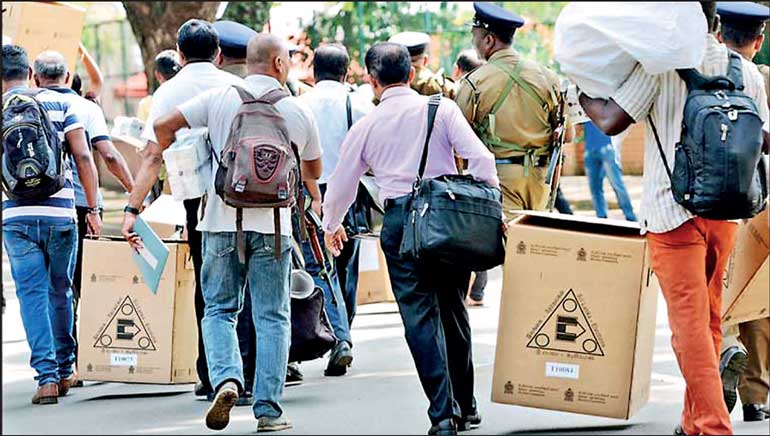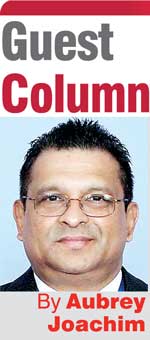Sunday Feb 15, 2026
Sunday Feb 15, 2026
Wednesday, 10 July 2024 00:22 - - {{hitsCtrl.values.hits}}

More than at any time in the past those in whose hands lies the power to choose their leaders will also decide their own futures and that of their children – Pic by Shehan Gunasekara
 There has never been as important a period in the history of Sri Lanka as will be the next few months. The country is still reeling under the financial and economic battering of two years ago. As per the latest statistics the country’s debt burden has ticked over the $ 100 billion mark – including the backlog of interest. Meanwhile, a deceptive sense of calm and even spots of prosperity – for some – seem to prevail on the surface disguising strong undercurrents of turmoil.
There has never been as important a period in the history of Sri Lanka as will be the next few months. The country is still reeling under the financial and economic battering of two years ago. As per the latest statistics the country’s debt burden has ticked over the $ 100 billion mark – including the backlog of interest. Meanwhile, a deceptive sense of calm and even spots of prosperity – for some – seem to prevail on the surface disguising strong undercurrents of turmoil.
This turmoil is more than just a single facet. One could debate which of them is worse but the combination is a deadly cocktail which unless mitigated has the potential to cripple the country and the lives of its citizens for decades to come. Yet, the solution to this complex situation lies – literally – in the hands of the stakeholders.
Citizens of Ceylon were granted Universal Franchise by the British in 1931 – over 90 years ago – when all citizens over 21 years of age were given the right to exercise their considered and democratic right to elect the government of their choice. In 1959 the voting age was reduced to 18 years of age. While voting is not compulsory, voter turnout has been reasonably high consistently. The country that boasts a reasonably high global average IQ – higher than all of its South Asian neighbours, all of Africa and a number of Asian countries (Data Pandas.org) as well as boasting the highest literacy rate in South Asia – 92.6% (UNESCO Institute for Statistics).
Therefore, taking these two factors into consideration it could be argued that the country has largely been governed by the peoples’ considered choice. In addition to the quality of its human capital Sri Lanka has also been blessed with other benefits such as pleasant climate, reasonable natural resources, geopolitical positioning and a richness in natural attractions of beaches, landscape, fauna and flora. It is not surprising that Sri Lanka has been described as God’s Garden of Eden. How then could this country with so much going for it have fallen into this state of despair?
The primary curse
It could be argued that post-independence bad decisions have been rife. The primary curse was the emergence of family dynasties which have been placed on pedestals and given a free reign to do as they please. Such a situation is not uncommon among countries in the region all of which have gone through the negativities of this system including pilfering of national wealth. The masses have taken sides based on their personal views or loyalties which has resulted in the emergence of nepotism, cronyism and corruption, evils that have beset the country and affected its progress. This is a cancerous situation that has been allowed to happen despite the calibre of the populace which has been identified as being of higher intellect, and aspirations.
Even though there have been intelligent, capable and visionary individuals who have entered the political arena such persons’ aspirations have been curtailed by dynastical leadership or being eliminated by insurgent forces. Others with inherent talent and leadership qualities choose not to get involved for similar reasons or recognise opportunities to benefit outside of the political arena from allowing the status quo to continue. The engrained collective mindset of the nation therefore has prevented the emergence of leaders who can lift the nation to the level it deserves and thereby offer Lankans a better quality of life. The same malady also permeates public administration where the best are not given the opportunity to add value to the nation.
Latent passions awakened
The country and its people were given a rude shock with the financial crash of 2022 – an event that was never expected but certainly should have been anticipated from the ‘reading of the tea leaves’ – pardon the pun. 74 wasted post-independence years erupted like a volcano and shocked the nation. The fuel and gas queues, power-cuts and price inflation of food items certainly brought the country to its knees. Suddenly latent passions were awakened. Large segments of the population took to the streets in a never-before-seen spectacle – the ‘Aragalaya’ – that saw another first time event in the history of the nation – the ouster of its President. The nation’s coffers were empty, it defaulted on its international financial obligations and its international reputation left in tatters – the result of years of mis-management and corruption. Fields were laid bare due to misplaced ideologies regarding organic fertilisers. Human capital was fleeing the ‘sinking ship’.
The ensuing constitutional quagmire paved way for the emergence of an unexpected leader who has by competence, sleight of hand or good fortune brought about a temporary reprieve which seems to have appeased some and brought about a false sense of comfort and even a fleeting ray of sunshine. The sugar coated version of the recently negotiated debt restructuring arrangements are being analysed and hotly debated. The gullible and naive may be fooled not realising that the ball has merely been kicked down the road for future generations to suffer and even worse predicament. However, the barbarians are at the gate in more than one sense – lenders braying for their monies, a new breed of leaders waiting in the wings and the next generation of voters lacking past political and social history shouting for a system change.
The question is – is it time for a change? As has been identified the fortunes – or misfortunes – of Sri Lanka has been democratically decided by its intelligent and literate citizens. The next phase, and into the future, will be no different. Its citizens will decide. But how will they do so? All indications are that the voters are divided in their opinions more than at any time in the past. Affiliations are shifting dynamically. This is true even at family unit level.
A new ‘force’
For the first time the traditional political parties or combinations of cabals are facing a challenge from a new ‘force’ seemingly propelled by the disgruntled younger and educated voting bloc. After all they will be burdened with sorting the messes of the past. They have lost faith in the status quo. Those loyal to the traditional political parties who continue to be from political dynasties appear to be in unfamiliar territory. The outcome of the forthcoming elections – presidential as well as parliamentary, therefore remains murky.
Nearly 70% of the global populace would have voted this year to determine their future political destinies. In the developed Western world, the issues that determine political outcomes are those such as migration, refugee intakes, environmental issues, energy futures and of course cost of living. In Sri Lanka the most important issue to the masses would of course be cost of living but in addition, employment, living standards, healthcare, education and taxes are also concerns. There is then a segment of the population to whom such matters are irrelevant given their lot in life. Instead theirs would be issues such as the maintenance of their upper-class lifestyles or the opportunity to get their next level imported luxury vehicle.
To others matters such as bringing to justice those responsible for past atrocities or equitable distribution of wealth and resources. The business community expectations are what will drive value creation in whatever sector they are involved in. Such are the diverse and polarising factors that would come into play and influence the political outcome.
However, at the current juncture what should influence Lankans in deciding the future political leadership of the country are much more fundamental issues, which if sorted out would lead to their other aspirations being met. The most important issue which should be prioritised is getting the country back on track from an economic and financial perspective. How can its massive debt burden be eased and the economy revitalised? Mere knee-jerk reaction to IMF dictates may not be the best option.
Take charge
of its own destiny
Sri Lanka must take charge of its own destiny. Productivity must be increased across the board in industry and agriculture. Export markets need to be opened up. International relationships and collaborations need to be diplomatically and intelligently managed. The country’s geo-political advantage must be craftily exploited. These multiple and complex strategic aspects cannot be addressed by the calibre of existing politicians from any side without the involvement of a public administration of the highest calibre and competence as well as drawing upon the intelligent and qualified to contribute. The role of the political leadership is to put the best and most qualified persons in these positions of execution without fear or favour and independent of political affiliations. This has never been in Sri Lanka’s political DNA.
These are all complexities that neither Lankan politicians nor the citizens have faced in the past. After all, the current scenario facing the country has never been seen in the past. Therefore, more than at any time in the past those in whose hands lies the power to choose their leaders will also decide their own futures and that of their children. However, the choices before them are not encouraging.
It would appear that none of the individuals standing for president (at this point in time) nor the political parties contesting to occupy the parliamentary seats can successfully address all the issues facing the nation and its people. This is a watershed moment in Sri Lanka’s history and its citizens will decide its future for decades to come. It is a time to ponder. Is it time for change? But change to what and who should be the change agents?
(The writer is former Global President of CIMA.)